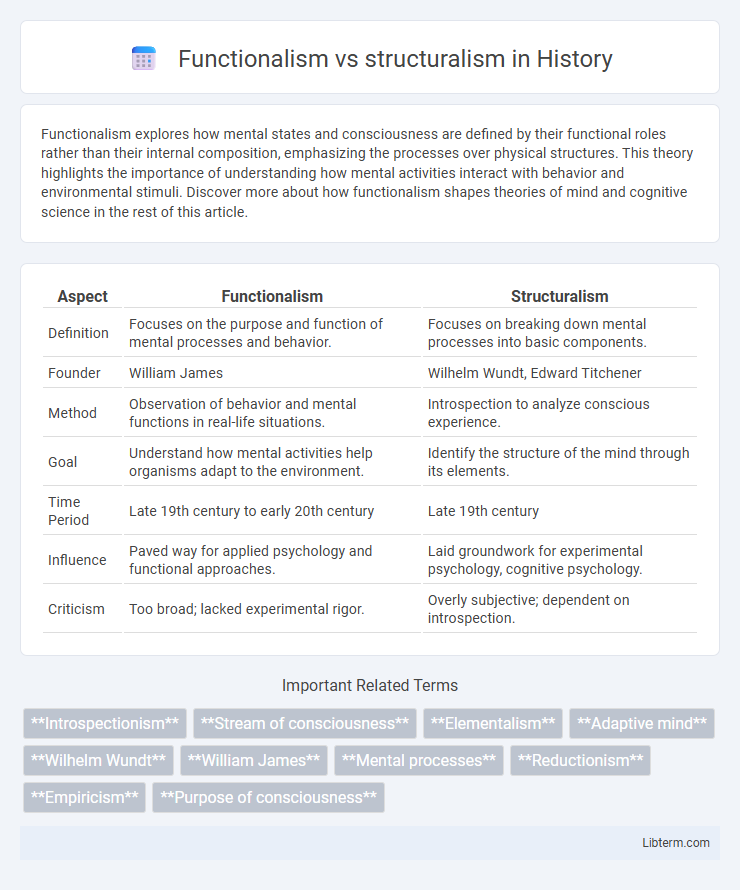Functionalism explores how mental states and consciousness are defined by their functional roles rather than their internal composition, emphasizing the processes over physical structures. This theory highlights the importance of understanding how mental activities interact with behavior and environmental stimuli. Discover more about how functionalism shapes theories of mind and cognitive science in the rest of this article.
Table of Comparison
| Aspect | Functionalism | Structuralism |
|---|---|---|
| Definition | Focuses on the purpose and function of mental processes and behavior. | Focuses on breaking down mental processes into basic components. |
| Founder | William James | Wilhelm Wundt, Edward Titchener |
| Method | Observation of behavior and mental functions in real-life situations. | Introspection to analyze conscious experience. |
| Goal | Understand how mental activities help organisms adapt to the environment. | Identify the structure of the mind through its elements. |
| Time Period | Late 19th century to early 20th century | Late 19th century |
| Influence | Paved way for applied psychology and functional approaches. | Laid groundwork for experimental psychology, cognitive psychology. |
| Criticism | Too broad; lacked experimental rigor. | Overly subjective; dependent on introspection. |
Introduction to Functionalism and Structuralism
Functionalism emphasizes the purpose of consciousness and behavior in adapting to the environment, originating from the work of William James and influenced by Darwinian ideas of evolution. Structuralism, developed by Wilhelm Wundt and Edward Titchener, focuses on breaking down mental processes into their basic components through introspection. Both schools laid foundational approaches in early psychology, with functionalism prioritizing the utility of mental processes and structuralism analyzing their underlying structure.
Historical Background and Origins
Functionalism emerged in the late 19th and early 20th centuries, influenced by William James and Charles Darwin's theories on adaptation and survival, emphasizing the purpose of mental processes. Structuralism, founded by Wilhelm Wundt and further developed by Edward Titchener, focused on breaking down mental processes into their most basic components through introspection during the late 19th century. Both schools of thought originated as attempts to establish psychology as a scientific discipline but diverged in methodology and focus, with structuralism analyzing conscious experience and functionalism exploring the functions of consciousness.
Key Theorists and Their Contributions
Functionalism, pioneered by William James, emphasized understanding mental processes by their purpose and adapting to the environment, influencing modern psychology's focus on behavior and cognition. Structuralism, founded by Wilhelm Wundt and advanced by Edward Titchener, aimed to analyze the mind's structure through introspection, contributing foundational methods for experimental psychology. Both paradigms shaped psychological theory, with functionalism steering toward applied psychology and structuralism providing rigorous techniques for studying conscious experience.
Core Principles of Structuralism
Structuralism emphasizes breaking down mental processes into the most basic components, focusing on the structure of the mind through introspection and analysis of conscious experience. It prioritizes the identification of elements such as sensations, images, and feelings as the building blocks of cognition, aiming to map the structure of the mind systematically. Core principles include the belief that understanding these mental elements reveals the underlying framework of consciousness and that mental phenomena can be studied scientifically through controlled methods.
Fundamental Concepts of Functionalism
Functionalism emphasizes the purpose of mental processes and behavior, focusing on how they help individuals adapt to their environment. It centers on the concept of mental operations serving practical needs, highlighting the role of consciousness and behavior in enabling survival and problem-solving. Key elements include the study of mind functionality, adaptation, and the dynamic interaction between organism and environment.
Methodologies Used in Both Approaches
Structuralism employs introspection as a primary methodology, analyzing the conscious mind by breaking down experiences into basic sensory components to understand the structure of mental processes. Functionalism utilizes observation and practical experimentation, emphasizing how mental processes help individuals adapt to their environments, often incorporating real-world applications and behavioral outcomes. Both approaches contrast in their focus: structuralism dissects mental content, while functionalism investigates mental functions and their usefulness.
Differences Between Functionalism and Structuralism
Functionalism emphasizes the purpose and adaptive functions of mental processes, exploring how behavior helps individuals interact with their environment, whereas structuralism focuses on breaking down mental processes into their most basic elements through introspection. Functionalism seeks to understand the role of consciousness in enabling survival and adaptation, while structuralism aims to map out the structure of the mind by analyzing components like sensations and feelings. Unlike structuralism's static approach, functionalism adopts a dynamic perspective emphasizing practical applications of mental functions.
Impact on Modern Psychology
Functionalism emphasized the purpose of mental processes, influencing modern psychology's focus on behavior and practical applications such as cognitive behavioral therapy. Structuralism's analysis of conscious experience laid the groundwork for experimental psychology techniques, shaping methods in sensory perception and introspection. Together, these schools established foundational principles that drive contemporary research on mind and behavior.
Criticisms and Limitations
Structuralism's reliance on introspection faced criticism due to its subjective nature and lack of scientific rigor, limiting its ability to provide objective data. Functionalism was criticized for its broad and vague definitions of mental processes, which made experimental testing difficult and reduced empirical validation. Both approaches overlooked unconscious processes and emotions, which later psychological theories addressed more comprehensively.
Legacy and Continuing Influence
Functionalism pioneered the exploration of mental processes by emphasizing their adaptive purposes, influencing modern psychology fields such as cognitive-behavioral therapy and educational psychology. Structuralism's focus on introspective analysis laid the groundwork for experimental methods and the systematic study of conscious experience, shaping cognitive psychology and neuropsychology. Both frameworks continue to inform psychological research methodologies and theory development, demonstrating enduring significance in understanding human mind and behavior.
Functionalism Infographic

 libterm.com
libterm.com